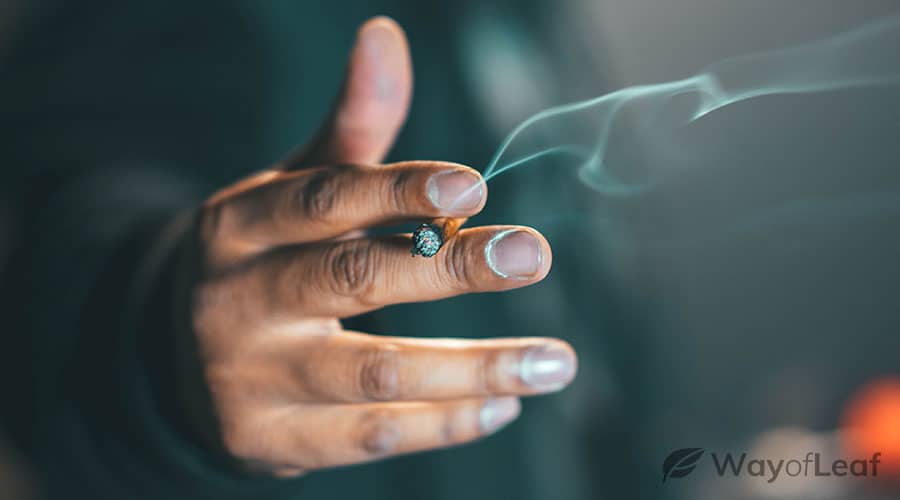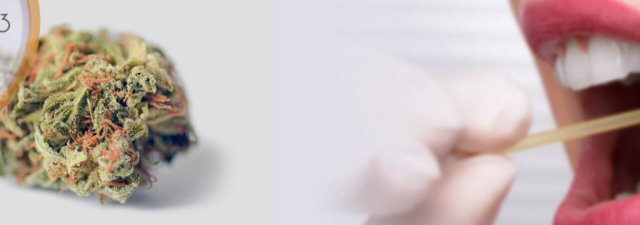It’s your worst nightmare: You stroll into work one morning and are told it’s time to pee into a cup for a randomized drug screening. You have been ‘compliant’ for most of the month, but last week, you took a couple rips and enjoyed a chill night in.
It hardly seems fair, does it? You live in a legalized state and smoke weed on your days off. However, companies in some states are still permitted to hire and fire employees based on whether they find THC metabolites (THC-COOH) in their urine.
Unfortunately, there is no ‘right’ answer to the title question of ‘will I pass a drug test if I smoked weed a week ago.’ The truth is, it depends on a lot of factors.
In this article, we look into why you have to take a drug test in the first place, how the body processes marijuana, and the likely timeframes regarding when THC will leave your system depending on your level of usage.
Why Do I Have to Be Drug Tested at Work?
Ronald Reagan is one of the main reasons employers are still drug testing their employees. During the Reagan administration, the War on Drugs was initiated and it’s been raging on for nearly 40 years. Its success, however, does not seem apparent, especially when reviewing modern statistics showing the rise in illicit substance use in recent years.
In 1986, Reagan signed an executive order, which made drug testing mandatory for federal employees and some contractors. America’s corporations followed suit, and many companies began testing employees en masse. By 1996, over 80% of the nation’s employers issued pre-employment drug screenings.
The American Management Association (AMA) last performed a drug testing survey in 2004, and the number of companies that performed drug tests had fallen to 62%. It is likely to have dropped even more since marijuana has become legal in dozens of states.
Has Drug Testing Deterred Marijuana Users?
On the face of it, testing employees for drugs makes sense, especially in specific industries. A truck driver or construction worker turning up stoned out of their mind is dangerous and could easily spell disaster. Back in the Reagan era, one of the goals of drug testing was to reduce negative impact on productivity, health, and safety in the workplace as a result of substance abuse.
While this reasoning may seem rational, a 2007 Substance Abuse and Mental Health Services Administration report found inconclusive evidence that drug screening acted as a sufficient deterrent to hazards in the workplace. In simple terms, people who wanted to get high during their spare time did so even with the specter of a drug screen hanging over them.
The rise of legalized marijuana has shaken things up to where some organizations have shown common sense by eliminating drug screening. In August 2018, Reuters Health wrote that one in seven American adults used weed in 2017. As the substance has since been legalized in more states, it isn’t hard to imagine that this figure has increased meaningfully.
It wouldn’t be out of bounds to suggest that 20% of American adults have used weed in the last year. By implementing a mandatory drug screening program, organizations are potentially eliminating thousands of suitable candidates in an era where America’s Skills Gap is enormous.
Here’s How Cannabis Is Processed by the Body
Your metabolism helps remove traces of cannabinoids from your body, and as each person’s metabolic rate varies, it is difficult to say if you will pass a drug screening or not, or how much time it will take your body to rid itself of THC metabolites. You could be ‘lucky’ and have a metabolism that processes marijuana extremely quickly, but do you want to rely on chance when it’s time to urinate into a cup?

The good news is you can aid your cause with lifestyle choices that affect how fast cannabis will exit your system. If you eat healthy, exercise regularly, and have a lower than average amount of body fat, your chances of passing a drug test increase.
Why? Because traces of marijuana in your system are fat-soluble and are stored in the body’s fat cells; if your body fat level is high, your body stores more cannabinoids than if you were leaner.
Variation in metabolic rate, physique, and physical shape are also reasons why you see such a broad range in marijuana detection windows. Other factors that determine how long THC stays in the system are:
- How You Consume Marijuana: If you smoke your weed, the THC levels in your body should drop within a few days. If you have an edible, the THC could be detectable for longer as the compounds are broken down slower.
- Potency: It should go without saying that super dank weed like Gorilla Glue #4, with a THC content approaching 30%, will remain in the body for longer than a 15-20% mid-shelf strain.
- Frequency: If you are a regular cannabis user, THC builds up in your system, so it takes longer to leave the body when you eventually abstain.
- Other Drugs: Some drugs impact the speed at which your body eliminates THC. Many antibiotics and calcium channel blockers can increase THC levels in the body by altering the concentration of enzymes that break the metabolites down. (Consequently, other antibiotics, such as rifampin, have been shown to have the opposite effect and increase the number of metabolic enzymes that break down THC).
How Long Is Marijuana Detectable For?
Aside from the factors mentioned above, the type of drug screening will play a significant role in how long it takes THC metabolites (THC-COOH) to leave the body. Here are the likely time-frames for four different types of testing:
Hair Testing
This is the worst test for marijuana users because a hair follicle test can find out if a person has used weed in the last 90 days! After you use marijuana, it reaches the hair follicles through tiny blood vessels, and trace amounts remain in the hair.
As hair typically grows at a rate of 0.5 inches a month, and testers take a sample of up to 1.5 inches, your use can be detected for up to three months. Fortunately, hair follicle testing is sporadic, and shaving your head beforehand is always an option (although it will seem suspicious if you suddenly turn up bald one day after 4 years with the same haircut).
Blood Testing
This is one of the best tests as far as cannabis users are concerned. While weed has been detected with blood tests after 25 days in heavy users, it is usually undetectable within 3 days, which means you are probably safe if you smoked over a week ago. Sadly, few companies use blood testing in their drug screening protocols.
Saliva Testing
This is another decent form of testing for users, because THC is rarely detectable in saliva tests for more than 72 hours, at least for infrequent users. Chronic users, on the other hand, could have THC detected in their system for up to 29 days with a saliva test.
Fortunately, second-hand exposure shouldn’t cause you problems because THC metabolites are only present in saliva when cannabis has been ingested or smoked. In some jurisdictions where marijuana is legal, saliva testing is used at the roadside by law enforcement officials to screen for impaired drivers.
Urine Testing
The vast majority of drug screenings involve testing a person’s urine. Once again, detection windows will vary according to numerous factors, but a study by Mayo Clinic Proceedings offered the following time-frames for urine drug tests, according to the frequency of cannabis use:
- Occasional Use (Maximum of 3 times a week): 3 days
- Moderate Use (3-4 times a week): 5-7 days
- Chronic User (Every Day): 10-15 days
- Chronic Heavy Users (Several Times a Day): 30+ days
We have heard stories of weed remaining in the system for up to 77 days in a urinalysis, but you would most likely need to give Cheech and Chong a run for their money in the pot smoking stakes for it to take that long.
A study by Paul Cary, published in Drug Court Review in 2005, looked at how long cannabinoids remain in the body after use. According to Cary’s research, THC metabolites only remained detectable for 3-4 days after consumption in first-time or occasional users. On the other hand, chronic users needed an average of 21 days to pass a urine test.
Another study, published in Experimental and Clinical Psychopharmacology, tried to find out how long weed stayed in the systems of individuals who reported smoking at least 5,000 times in their life. The 17 volunteers agreed to abstain for 28 days, and the results were fascinating. Five of the subjects were able to pass a urine test within one week! Four others passed by the end of week two, while two more passed after 21 days.
At the end of the study, only six of the volunteers failed a drug test after 28 days. The study clearly showed the vast difference in how people process marijuana, but also suggested that even lifelong users have at least half a chance of passing a urine test within a month.
Will I Pass a Drug Test if I Smoked One Week Ago? – Final Answer
It is immensely frustrating that a practice as outdated as employment drug screenings continues to threaten the livelihoods of hardworking Americans who enjoy a toke or two during their time off work. Fortunately, there are plenty of trailblazing organizations that have consigned drug testing to the dustbin of history, where it belongs.
Sadly, a significant proportion of companies, even those in legal states such as California, continue to drug screen their employees. In answer to the title question: If you are a casual, infrequent, or first-time user, there is a decent chance that you will pass a drug test one week after your last time using marijuana. Nevertheless, there are numerous factors that will come into play in terms of how quickly your metabolism will rid the body of THC metabolites.
If you are a frequent user, the risk of failing the test within one week increases significantly. If you are a chronic user, there is a strong possibility that you will fail the test. Those who have been on a major potent strain binge in the last week or two are also at serious risk.
For those in a severe bind, however, there are options available. You can purchase synthetic urine, or you can rely on the hit-and-miss nature of detox drinks. You could also try one of many homemade drinks that are said to help you pass a urinalysis. We can’t recommend or endorse any of these methods, however, because the results are wildly unpredictable.
In any event, if you fail the drug screening, there may be a second, more sensitive, gas-chromatography-mass spectrometry test; although many employers won’t bother with this since they cost at least $200 per test! All things considered, you are at the mercy of your state’s laws and protections, which most employers are forced to abide by.
In states such as Vermont and Minnesota, for example, employers are not allowed to fire anyone who fails a drug test for the first time if they agree to a rehabilitation program. In many cases, you will be reprimanded rather than fired, but that can also depend on your company’s rule book if you’re not protected by state law.


![What Is Powdered Urine? [Does It Really Work?]](https://wayofleaf.com/wp-content/uploads/2019/06/wol_what-is-powdered-urine-640x225.jpg)





![How to Pass a Mouth Swab Drug Test [Complete Guide]](https://wayofleaf.com/wp-content/uploads/2019/03/wol-how-to-pass-a-mouth-swab-drug-test-640x225.jpg)

![How Long Does Marijuana Stay in Your System? [Fully Explained]](https://wayofleaf.com/wp-content/uploads/2019/06/how-long-does-weed-stay-in-your-system-640x225.jpg)

